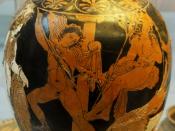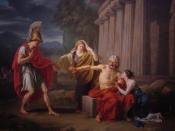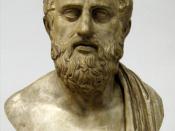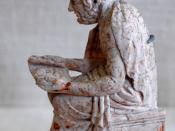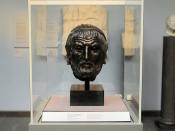Playwrights of Greek theater tend to philosophize aloud when constructing the chorus. In his play, Oedipus Rex, Sophocles expresses concern for his generation's mounting faith in seers in lines 561-572. It should be noted, however, that he invokes a blanched form of preterition when writing this speech""it's function being to prevent his audience from finding his reservations sacrilegious of the state religion. Preterition typically occurs in three segments. First, the writer must erect a platform that draws the audience's attention. Next, he removes a unique idea. Lastly, he draws attention to its absence, simply by glancing over its vacancy with a few well-placed words. By blatantly omitting an important part of the setting, this author indirectly builds a statement that no man can know the gods' true intentions.
The aforementioned passage begins to resemble preterition when Sophocles describes Zeus and Apollo as omniscient gods. By definition, gods are infinitely aware of the structure and occurrences within a universe.
An irate Tiresias accuses Oedipus of murdering his father and marrying his mother. Oedipus, on the other hand, has reason to believe that he has done neither of these things, as he is under the impression that Polybus and Merope are his father and mother.
With that in focus, the stage is set. An ideal is next removed by slight of hand. By all logic, neither man should have superior knowledge of fate's threads, and with the blink of an eye, the overwhelming blanket of security that seers provide to those who seek to know what Fate's have in store is gone. Reason transforms Tirerias into a powerless mortal, like Oedipus. Chorus members are removed from fundamentalist shackles of thought and are allowed to question the gods' instruments for logic and integrity. "in wits a man may surpass his fellow men; but that a mortal seer knows more than I know""where hath this been proven?" Sophocles then draw attention to this question in the last part of the this antistrophe.
By Sophocles' indirection, the audience is led to an inescapable conclusion: if the seer's claims have no real substance, then only tangible evidence remains for inspection. The chorus, shown in the last part of this passage representing the feelings of the kingdom, presents historical knowledge regarding Oedipus' character, when it remarks, "how without sign assured, can I blame him who saved our State when the winged songstress came, Tested and tried in the light of us all, like gold assayed? How can I now assent when a crime is on Oedipus laid?" The point that Sophocles is making with this speech is that regardless of the road traveled by man for reason's sake, it is the only road. Though trails blazed by dreams do lead to great things, one's judgment must hold steadfastly to the green knolls of reality. The final answer to any question is truth.


